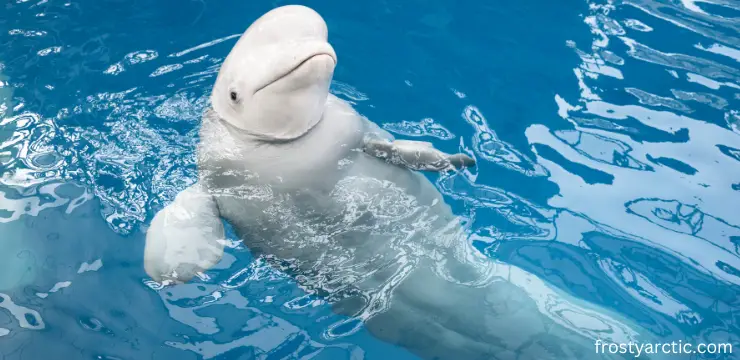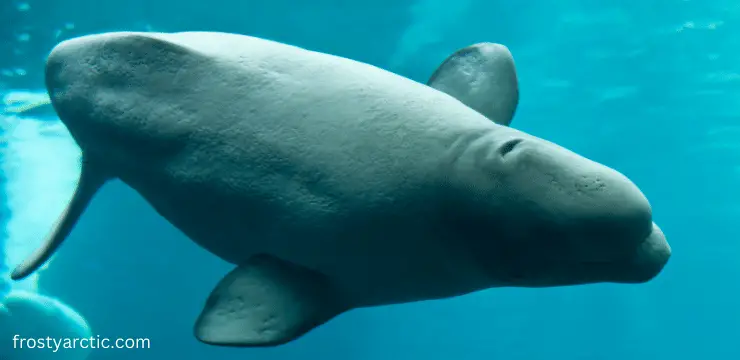No, beluga whales are not endangered nowadays, but they are at high risk of being so. A few species of beluga whales are already extinct, and a few more are expected to be extinct soon. Thus, there is no scope for relief thinking that beluga whales are not endangered.
Today, I will discuss the importance, threats, and ways of protecting beluga whales. If you are concerned about these amazing mammals, stick to the article till the end. Without wasting any time, let’s dive into the main topic.
Why Are Beluga Whales So Important?
Beluga whales are at the top of the food chain of an ecosystem. That’s the main reason for their importance. A few more reasons for their importance are given below:
1) Fertilizer for phytoplankton
Beluga whale poop is good fertilizer for phytoplankton. These microscopic plants remove millions of tons of carbon dioxide from the atmosphere and produce oxygen in massive amounts. This results in a better environment for all living beings.
2) Indicators of the ecosystem
They are the indicators of an ecosystem’s health. They control the population of prey that sits below them in the food web and help balance the numbers of marine snails, arctic cod, plankton, and crustaceans. Besides, they are also a food source for polar bears, orcas, and humans.
3) Sources of nutrients
Beluga whales are a significant source of nutrients for decomposers and producers. After their death, their carcasses sink to the bottom of the sea. Then, it becomes an excellent food source for decomposers.
4) Source of ambergris
When a beluga whale goes through indigestion, its upset stomach creates ambergris. This ambergris is one kind of rare substance and is highly valued. This rare substance is mainly used in perfume and pharmaceuticals.
5) Sentinel species
Beluga whales are called sentinel species as they can accumulate pollutants, which helps determine the quality of the marine environment.
6) Scientific research values
Their blubber, diet, behavior, and contaminants found in their liver and kidney benefit scientists. This is because scientists can measure the concentration of contaminants like mercury by using those factors.
Are Beluga Whales Really Endangered?
It was mentioned earlier that beluga whales are not completely endangered but are at risk of being endangered. A few stocks of beluga whales are almost extinct, which may make you think that the creature is endangered.
From 1979 to now, the number of beluga whales has decreased by almost 80%. Ungava Bay stocks of beluga whales can be termed “functionally extinct” as it consists of only 32 individuals.
Also, cook-inlet beluga whales’ numbers are decreasing at an alarming rate. Cook inlet beluga whales were 1300; in 2018, it became just 279. If the situation doesn’t change, soon they will be considered endangered.
Why Are Beluga Whales Not Endangered but Anticipated To Become Endangered?
Animals are considered endangered when the decline rate is more than 20% in the period of 5 years or there are less than 2,500 adults. Beluga whales meet none of these conditions, and that is why they are not considered endangered.
However, a few beluga whale species are endangered due to threats and stressors. Human disturbance, pollution, and habitat degradation are the main culprits behind this.
Top 5 Reasons Why Beluga Whales Are At Risk Of Becoming Endangered
Here are some more reasons why beluga whales are at risk of becoming endangered soon:
1) Hunting
Sport and commercial hunting are a threat to the Beluga whale population. Though beluga hunting is banned, people still hunt them for subsistence.
2) Underwater noise pollution
Beluga whales use echolocation for navigation and searching for food. That’s why hearing ability is essential for their survival. But sound pollution can make a beluga whale go deaf, and a deaf beluga can’t survive underwater.
3) Reduced access to feeding
Gas exploration and increased boat traffic are responsible for creating barriers for beluga whales. These barriers limit their access to their feeding, migration, and breeding areas. Also, these activities degrade the habitats of beluga whales.
4) Water contaminants
Urban runoff, wastewater discharge, and garbage from industrial processes exert a lot of contaminants in marine water.
For example, polychlorinated biphenyls(PCBs), dichlorodiphenyltrichloroethane(DDT), and many metals (such as lead, mercury, and cadmium).
Beluga whales cannot accumulate these contaminants for a longer period. It risks their immune and reproductive system.
5) Climate change
Overfishing, the impact of climate change, and habitat change can cause scarcity in food available for Beluga Whales. Because of this, their reproductive rate will decline, and the mortality rate will increase significantly.

Do Humans Hunt Beluga Whales? Why?
Yes. Beluga whales are mainly hunted for human consumption. Humans consume beluga whales as meat or muktuk.
Generally, muktuk is the skin of beluga whales, including the outer layer of blubber. Oil extraction from beluga whales is also used as fuel, sometimes for cooking.
Beluga whale’s skin is thick enough among all cetaceans to use as leather. This leather is termed “porpoise leather.” For this purpose, tanned-skin beluga whales are used.
Europeans are fond of using beluga whales’ fine melon oil for lubricating machinery and watches. Moreover, this melon oil is also used for illuminating lighthouses.
Do Dead Beluga Whales Have Any Business Value?
Yes. Beluga whales also have business values. After the death of beluga whales, its carcass can be used for fertilizing purposes.
Besides, the bones of beluga whales are used in crafts. These crafts made from beluga whale bones have high demand among people, and the price is also quite high.
Ribs of dead beluga whales are vital construction materials for hunting. Other bones are mainly used for tools or utensils. Furthermore, the blubber of dead beluga whales is processed into oil, which is used for lamps.
What Happens When a Beluga Whale Dies? Are They Buried? Or Used for Business?
When a beluga whale dies in the sea, its body decomposes and becomes food for small deep-water marine creatures. Beached whales can be buried or can be used in numerous ways.
When a beluga whale dies, it might sink or float. When it sinks, it enriches the seafloor; when it floats, many other creatures can have them as food.
But when the dead body is stranded or beached, it will create health hazards, rotten smell, and explosion risk if it stays for a longer time. However, dead beluga whales are buried right away in 10 feet holes on the beach to prevent such situations.
Sometimes, they are also again disposed of into the sea by towing. But, undoubtedly, a beluga whale is heavy, and it’s difficult to move the body.
Hence, the brilliant way to dispose of them is to cut them into pieces and throw them into seawater, incinerate, or landfill.
Sometimes scientists conduct a post-mortem of dead beluga bodies and take samples for further experiments.
After that, they decompose or preserve the body. Furthermore, dead beluga whales’ bones, blubber, and skin are used for various business purposes.

Do Humans Eat Beluga Whales?
Yes. Humans eat beluga whales. I mentioned above that Beluga whales’ meat, skin, and blubber can be prepared and eaten in numerous ways.
Beluga meat, skin, and blubber can be eaten raw, dried, aged, cooked, or boiled as soups and stews. Many people like skin more. On the other hand, some people love the bones and cartilage near the flippers.
Why Do Inuit People Eat Raw Beluga?
Due to unique adaptations to the climate, ecosystem, seascape, and landscape, Inuit people developed a food habit that is available and serves them nourishment, and eating raw beluga is one of them.
Beluga blubber is an excellent source of omega-3-fatty acid and protein. This blubber also consists of retinol, zinc, and many other nutrients.
Most importantly, it consists of a lot of vitamin C, which is why Inuit people never had to suffer from scurvy.
But cooking may deteriorate the nutritional value and quality of the beluga. That’s why they eat raw beluga.
What Does Beluga Taste Like?
Beluga whales have a mixed taste when eaten and may differ from person to person. But beluga’s taste is generally similar to the taste of reindeer or moose.
Someone may find its unrefined flavor unpleasant. That is why beluga whales are generally cured, marinated, and slathered with a flavored sauce.
Then, it will more likely taste like a delicious hybrid taste of beef fish.
How Many Beluga Whales Are Left in The World?
The number of beluga whales is declining day by day. Currently, the worldwide population of beluga whales is approximately 150000-200000.
The stock of Western Hudson Bay has the greatest number of beluga whales. Almost 55,000 individual beluga whales are there.
What Would Happen If the Beluga Went Extinct?
Nothing much would happen if beluga went extinct. But still, it will do some damage to the food chain and environment.
Beluga whales maintain a balance in the number of their prey. But, if it goes extinct, the population will increase. As beluga whales are not the only creatures that eat those prey, there won’t be much increase. But, still, the balance will be a little.
As we know, beluga whales are a pretty good source of food for polar bears. If beluga whales go extinct, polar bears’ food sources will be scarce. That will result in a declining number of polar bears.
Moreover, the poop of beluga whales helps stabilize the offset of carbon in the environment. That means the carbon balance of the atmosphere will be hampered when beluga whales go extinct.
What Are the Possibilities Of Beluga Whales Being Endangered?
There is a high possibility of beluga whales being endangered. Currently, a few stocks of beluga whales have already enlisted as endangered.
Increasing seawater noise pollution, contaminants, oil, and boat traffic on the sea continuously threaten their life.
If these keep going on, then the time is not far when only a few individual beluga whales will be left on the earth.
Why Must We Protect Beluga Whales?
Beluga whales have a vital role in the ecosystem and marine environment. The absence of beluga whales will hamper the overall health of the ecology and marine environment. That’s why we must protect beluga whales from becoming extinct.
Things To Consider Preventing Them from Becoming Extinct
We can do the following things to prevent beluga whales from becoming extinct:
- We have to stop and prevent underwear sound pollution.
- Protect the habitats of Beluga Whales.
- We should not throw garbage in the ocean.
- Have to monitor subsistence harvests.
- Leaking oil from factories and sheep is hazardous for beluga whales. Hence, we must stop throwing them into the sea.
- We must review and reconsider those projects that can cause harm to beluga whales and their habitats.
- Raising awareness among people about the harmful effects on Beluga Whales of seawater pollution.
Final Words
Beluga whales are generally arctic and subarctic cetaceans. They are amiable animals and vital to the economy and environment. Due to many reasons, their population is going down rapidly.
There is a high chance that beluga whales will be extinct if they are not protected. Hence, we must try to avoid doing things that are harmful to beluga whales’ existence.



3 thoughts on “Are Beluga Whales Endangered? Let’s Explore Its Extinction Fact”